I would have died for Viktor Orbán back in the day, but then he built the 2.0 version of the Kádár regime
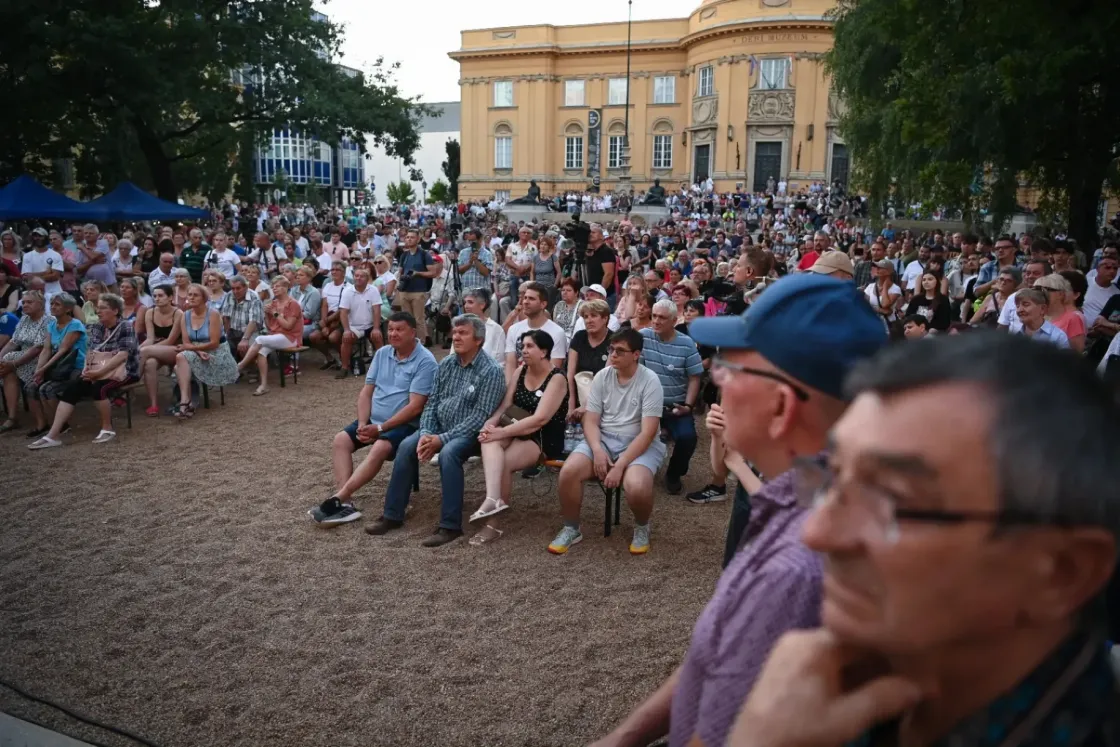
The pungent smell of onions and bread with lard had permeated the air at Debrecen's Déri Square by the time Péter Magyar arrived at the Tuesday stop on his tour across Hungary around 7:30 p.m. The Tisza Party president did not arrive by canoe or bicycle this time (as he did to the first few stops of his tour, in smaller towns near the river Tisza – TN) but rode in on a scooter, carrying a Hungarian flag in his hand, as has been his custom. By this time, Tisza party volunteers from the region had made enough sandwiches to feed an army, so there was plenty to go around among the hundreds of people who wanted to be there for the event announced as an interactive Magyar Info. It being interactive meant that anyone from the audience could ask Péter Magyar and the Tisza Party experts present – at this event, these were chief orthopedic surgeon Zsolt Hegedűs and Kriszta Bódis (head of an NGO which has for decades been working with underprivileged families – ed), who is assisting Péter Magyar's party as a social policy advisor.
Unlike János Lázár, minister of Construction and Transport, who has been holding similar public events around the country, Péter Magyar did not receive particularly critical questions, with the exception of one. He and the Tisza experts were asked mainly about how they would develop rail transport and the healthcare system, and how they would improve the mental health of Hungarians. Among others, Péter Magyar mentioned that in a future Tisza government, four ministers—the ministers of justice, health, financial affairs, and social policy—would have veto power over all government decisions.
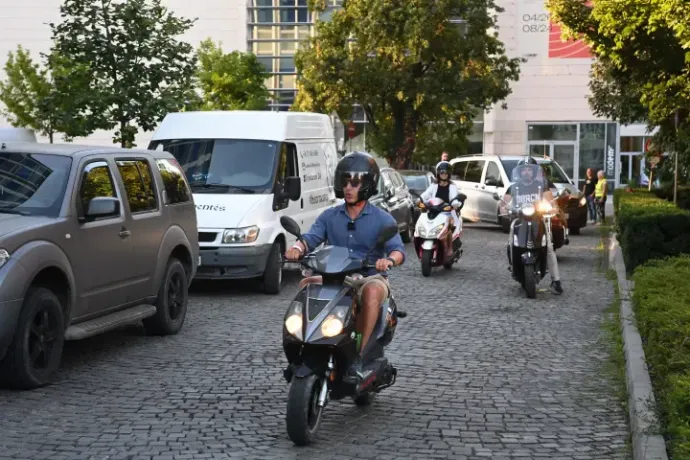
The only critical question came from the young man who had recently become known for bringing up the plundering of the country and the soaring inflation at János Lázár's event in Berettyóújfalu. He asked Péter Magyar to stand up for Tisza Party's former coordinator in Fejér County, whom the government media had sought to discredit by claiming that she had appeared in pornographic films. In his view, the propaganda had dehumanized the woman, but Magyar's communication was also unfair, as he had drawn a parallel between pornography and the plundering of Budapest's downtown in one of his posts. Magyar responded by saying that the interviewer couldn't know what the internal communication within the party was like about this matter, and then went on to say that he must choose every word he says very carefully because of the propaganda machinery. He wrapped up the conversation by apologizing if the young man felt that he had offended anyone in relation to this matter.
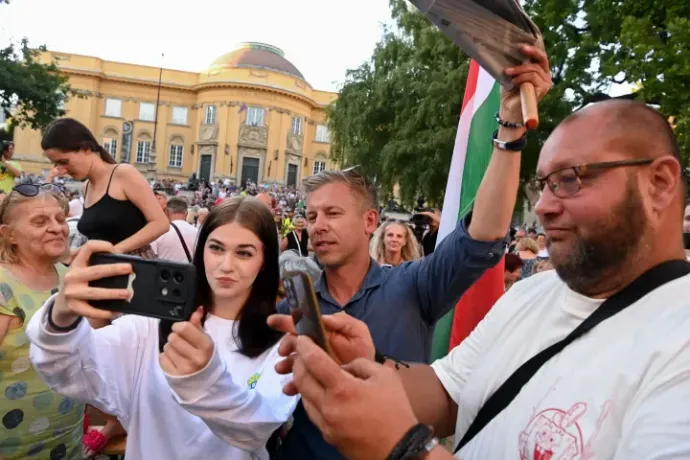
This was the third time Péter Magyar has visited Debrecen since bursting onto the public scene. Debrecen is considered a difficult place for Magyar and the Tisza party because the city has traditionally been a Fidesz stronghold, with only Fidesz candidates being able to win in Debrecen's individual constituencies since 2014. However, the last elections show that Fidesz's power may be beginning to waver here too. Fidesz candidate László Papp won nearly 50 percent of the vote at last June's municipal election, which is still considered a good result, but in 2019 he received almost 62 percent. Although Fidesz won 40.6 percent of the vote at the EP elections, Tisza came unexpectedly close to the ruling party here, securing 37.5 percent of the votes. The figures therefore suggest that Tisza could have a chance in Debrecen in the 2026 elections.
It was hardly a coincidence that on Tuesday Péter Magyar emphasized that Debrecen only used to be a stronghold of Fidesz. One of the novelties of János Lázár's events has been that people have been willing to express critical opinions about the government on camera and in public, which has been virtually unheard of in the past 15 years. How advantageous this is for Fidesz and the government is another question.
This was one of the things we wanted to find out from the very diverse audience – alongside older folks, there was also a good number of young people in the crowd.
Edit and Miklós represented the older generation. They volunteer at one of Tisza's local groups in Debrecen, working behind the counter and handing out flyers when needed. According to Edit, more and more people in Debrecen are also beginning to feel the need for change because "people aren't stupid, they can see how this mafia state operates. "You can literally feel it in the air. On the bus, in public squares, in the way people talk to each other," added Miklós, who pointed out that he has lived in Debrecen for fifty years. He believes that the only reason the Fidesz mayor was able to win last year was because he didn't have a challenger from Tisza and the opposition failed to come together.
According to Edit, even those who have kept silent until now are finding the courage to speak up because they have nothing to lose. She has never been involved in politics before, and the only thing she wants from Péter Magyar is that he arrange for Hungary to join the European Public Prosecutor's Office and hold the Orbán government to account.
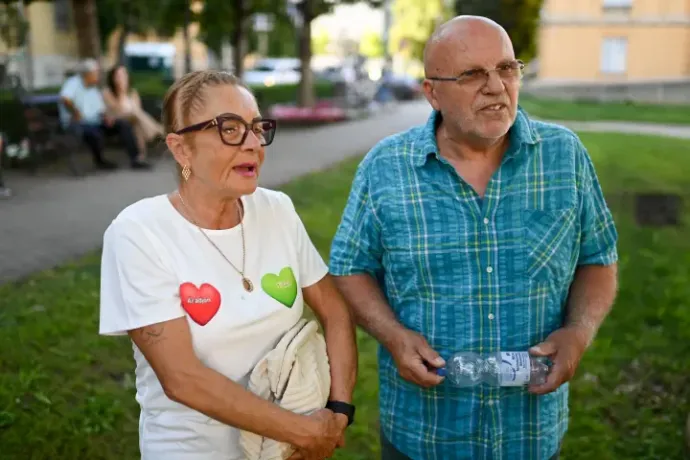
Gergő came to hear Péter Magyar with his mother, Anikó. They have been following Péter Magyar's current tour of the country from the very beginning and have noticed that even people who have been politically passive so far and were not committed voters of either the opposition or Fidesz, have been going to his events. "This could be a hidden resource in the 2026 elections. This could be Péter's big chance to appeal to those who are not committed to either side" Gergő said.
According to Anikó, more and more people now dare to express their political opinions, but many are still afraid to attend events such as Tuesday's. Those who work for state-owned companies or local governments are particularly afraid of possible reprisals. It is telling that many people did not even want to speak to us anonymously during the event, and some specifically refused to answer our questions, citing their place of work as a reason.
Gergő said that he voted for Fidesz in 2010. "There was a five-year period when I would have died for Viktor Orbán," he said. He explained that he became disillusioned with Fidesz because he believes Orbán has built a "2.0 version of the Kádár regime." Anikó also used to be a long-time Fidesz voter because she thought it served her children's interests the best. She now supports Péter Magyar because she wants change, which she believes the leader of the Tisza Party represents. “If there is no change now, if Péter Magyar cannot bring about change, then it's over, there will be nothing in Hungary for the next hundred years.”
As Gergő sees it, the situation is the same as it was thirty-five years ago, when Viktor Orbán was in a similar position as Péter Magyar is today. “Now that a slim-fit guy (in a speech given last July, referring to his opposition, Orbán spoke about “'self-indulgent liberal politicians in their slim-fit outfits, consuming lattes, avocados and food that's free from everything' – TN ) is up against a pot-bellied despot, the contrast is sharp. There is a dynamic, there's momentum, the right rhetoric, and Péter Magyar knows how to appeal to young people.” Gergő added that he fears that after the 2026 elections, a situation similar to the one in the Budapest City Council will develop, where no political force has a majority, but nobody wants a two-thirds majority either, because they have seen what that leads to. "If Péter doesn't have a governing majority, we're looking at a very shitty four years ahead of us," Gergő summed up.
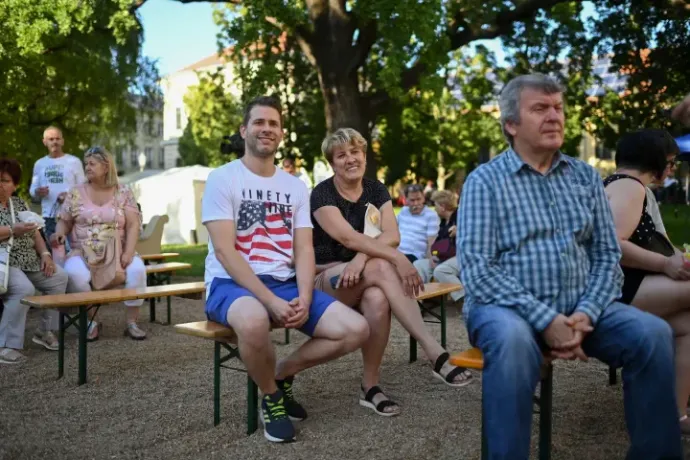
We also spoke with a family of three. They said they stayed for the entire three-hour event because they wanted to get informed, as they hardly ever hear anything about Péter Magyar and the Tisza Party in the media. Both of the adults used to be Fidesz voters for a long time, but the mother became disillusioned with the party after the 2022 elections. It was then that she realized how much trouble the healthcare and education systems were in. In their opinion, Debrecen is no longer a Fidesz city, only its leadership is. They believe that the shift in public opinion is evident in the fact that even among Tisza supporters, not all are necessarily fervent supporters of Péter Magyar, but are simply opposed to Fidesz. They also feel that people have been discussing politics more freely, which they attribute to the fact that more and more well-known people, musicians, and actors are being vocal about their political opinions.
Twenty-one-year-old Ákos is also one of the younger ones we spoke with at the Debrecen event. He came to Déri Square because he wanted to hear Péter Magyar in person. He started following politics more closely because of the presidential clemency case; until then, he wasn't very interested because he didn't see any political force that could be taken seriously. And there weren't many political issues he could talk about with his friends anyways. "But now, with one scandal following another, there's always something to talk about." He believes that Fidesz is still very entrenched in Debrecen, but finds it reassuring that it wasn't just young people who went out to see Péter Magyar, but older ones as well. Besides corruption and the pedophilia-related cases, what bothers him most about Fidesz is that they are accusing their opponents of the very things they themselves are doing. “No one in my generation sympathizes with Fidesz. They handled the migration issue well, but that's all. And all they are doing now, with offering tax breaks and such is only window dressing.”
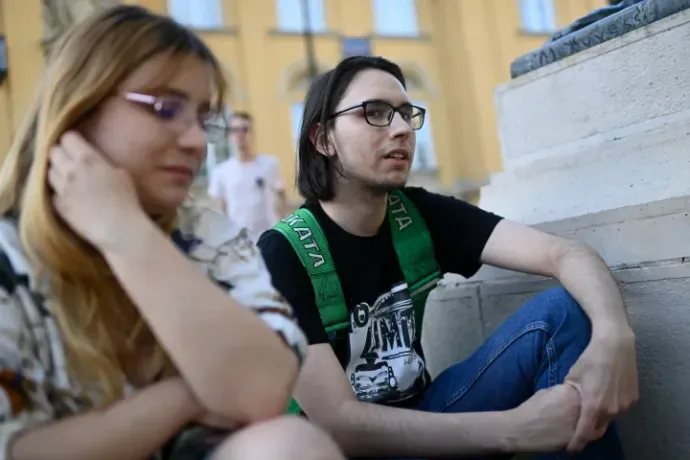
The 2026 parliamentary elections will be the first time Bogi and Balázs will get to vote. They're both studying in Debrecen, and this wasn't the first time they've seen Péter Magyar in person. They were at his rally in Debrecen last year and also attended his event on March 15 this year. They are not necessarily interested in Péter Magyar's character, but rather in the fact that he embodies the hope for regime change. They would vote for Tisza to achieve this, even though it is not yet known who will be running in the Debrecen constituencies. "For me, regime change is more important than anything else," said Balázs , who believes that Tisza could achieve good results in Debrecen, but considers an individual victory questionable.
He likes the fact that the Tisza Party has a program, or that at least an outline of what they would do with the country if they were in power is beginning to take shape. For example, he fully agrees with the taxation of fortunes exceeding five billion forints. They also have reservations about Péter Magyar and his party, and argue that they cannot guarantee that they will not do the same thing that Fidesz did in 2010. "After all, we are talking about someone who came from within Fidesz and who is familiar with their tactics." They were unable to say whether or not there was a mood for a change of government in Debrecen, but what they have observed in everyday life is that committed Fidesz voters are becoming more and more extreme, and the divide between the two camps is growing. "There's no such a thing as being neither a Fidesz supporter nor a Tisza supporter," said Bogi.
Zoli and Zsuzsi have been following Péter Magyar in the media for a long time, but this was the first time they had heard him speak in person. In fact, it was the first political event they had ever attended. They had always voted for the opposition, but they had never seen the opposition organize an event on the scale of the gatherings of Péter Magyar. It is not him as a person that they find interesting, but what he says and the fact that he is going everywhere. "He even goes to the smallest villages and answers questions in the same way he does here, and he is credible every single time." They also find it important that Péter Magyar is addressing issues that concern everyone, such as healthcare, transportation, and education.
Zoli said that before Péter Magyar appeared, he didn't dare talk to anyone about politics, as it would have been conspicuous for someone from Debrecen not to sympathize with Fidesz. By now, he has reached the point where he is even willing to admit which party he supports at work. "Even when just walking down the street, you see people talking about how they've had enough and want change," Zsuzsi added. They believe that Fidesz's mistakes have also played a role in this; since the presidential clemency scandal, they have only made bad decisions, and the people's eyes have now been opened.
For more quick, accurate and impartial news from and about Hungary, subscribe to the Telex English newsletter!